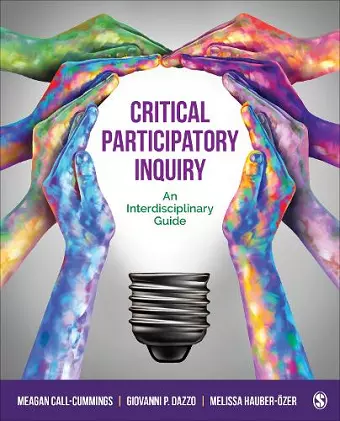Critical Participatory Inquiry
An Interdisciplinary Guide
Meagan Call-Cummings author Giovanni P Dazzo author Melissa Hauber-Özer author
Format:Paperback
Publisher:SAGE Publications Inc
Published:11th Dec '23
Should be back in stock very soon

This interdisciplinary guide explores critical participatory inquiry, emphasizing collaborative research methods. It provides theoretical insights, practical tools, and examples across various fields, enabling ethical co-creation of knowledge with communities.
Critical Participatory Inquiry: An Interdisciplinary Guide explores the essential principles of this collaborative research methodology, aimed at students, practitioners, and research collectives. The authors emphasize the importance of uncovering new research possibilities, rooted in the emancipatory foundations of Critical Participatory Inquiry (CPI). This approach seeks to challenge and deconstruct inequitable conditions and practices, fostering a more equitable research landscape.
The book effectively integrates theoretical perspectives with practical tools for data collection and analysis, providing a comprehensive overview of the research process from inception to completion. Readers are equipped with the knowledge to engage in ethical and effective co-creation of knowledge. By focusing on the shared principles found in various action and participatory research methods, the authors guide readers in designing and conducting research collaboratively with communities, rather than on them.
With a diverse range of examples drawn from fields such as public health, social work, psychology, education, criminal justice, and conflict resolution, this text is well-suited for graduate-level courses. It reflects the interdisciplinary nature of participatory research, accommodating collectives of varying sizes and compositions. Overall, Critical Participatory Inquiry serves as a valuable resource for those interested in advancing their understanding and practice of participatory research in a thoughtful and impactful manner.
The most thoughtful approach to CPI to date, with lots of nuanced discussion of power, inequality and positionality. The text is replete with examples from community studies using a variety of media. -- Samuel Collins
The book is solidly grounded in relevant foundational and contemporary research and presents an array of robust, innovative participatory and arts-based methods to engage in collaborative inquiry with a research collective. The book invites researchers into the process and provides a set of reflexive guides and practices with which to conceptualize and implement participatory research in a variety of contexts and spaces. -- Heidi R. Bacon
This book offers a nuanced and complex look at critical participatory research. The approach of the text offers an insight into how these scholars arrived at the work and how to then do this work from varying perspectives. -- Anne M. Hornak
I found the practice activities and focus activities very thought-provoking and valuable from a teaching standpoint. Overall, the writing continues to be very accessible. -- Julie Steinkopf
This is a thought provoking and challenging new way to look at research in the context of social justice. -- S. Jay Kuder
This is the first time I have read a comprehensive book chapter covering digital and social media research so succinctly.
The authors provided examples of creative ways to take action with research and sharing findings. I think this message is important in taking action; we can and should disseminate research through multiple avenues.
-- Nancy A Watkins
This book introduces Critical Practitioner Inquiry that is user-friendly and socially aware. The authors are well-versed in the literature, but their personal experiences with CPI truly make the book come to life.
The connections to real-world examples were outstanding. The authors did a wonderful job of gaining credibility by sharing their own work as well as work that has been published in the field.
-- Ryan Flessner
I like its flow, the use of a reference list after every chapter. It is rich in content and uses real life examples. -- Margaret Lombe
The post-colonial and post-structural, dialogic approach makes this pretty unique and helpful. -- Louise Jezierski
The topical coverage feels very unique for a text of this kind. For instance, discussions on power dynamics, creating relational connections, forming inquiry collectives.
The comprehensiveness of the chapter discussions is notable. I also appreciated that this book was unflinching in discussions on the epistemological foundations of CPI and the importance these positions have on the methodology.
-- Shannon Calderone
Each chapter was well-organized, presented just the right amount of content, and referenced helpful examples to support the learning objectives.
The conversational tone makes this text feel supportive and accessible.
-- Dr. Shannon Alpert
This book is an authentic and accessible take on CPR. The authors voice, structure, flow and content are all spot on…. Overall, the book is both hard hitting and cuts no corners, WHILE being accessible.
-- Steven D. DrouinThis text provides a rich overview of the foundations of critical participatory research, allowing students to explore, examine, reflect, and take action with specific techniques, inquiry, and suggested activities in each chapter.
-- Maryam Kia-Keating
This text provides a great history of CPI and uses reflective exercises to help students critically examine how knowledge is created and why this is important for democratizing research. -- Felicia J. Tuggle
This book considers research in a fresh way that places the community fully in the center. It challenges traditional research epistemology which can replicate the very systems of domination and exclusion we seek to break down. -- Kirk A. Foster
Easy for students to read and digest. -- Jessica Wendorf Muhamad
ISBN: 9781071825860
Dimensions: unknown
Weight: 610g
328 pages